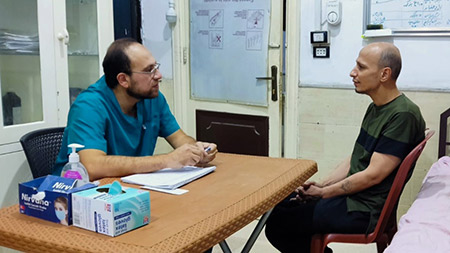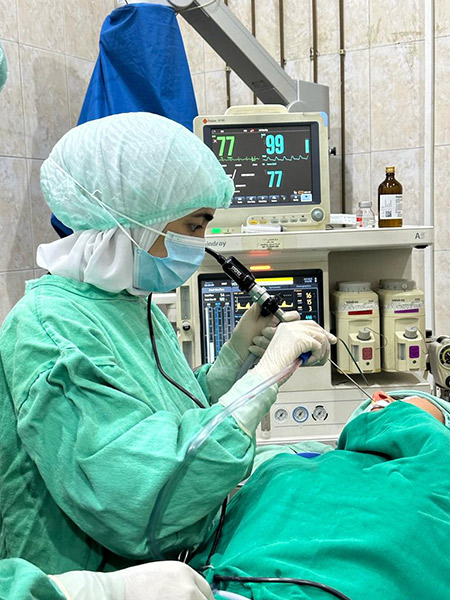 Caption 1: Dr. Ghazwan Bweedani at Azaz Mental Health Hospital with a patient.
Caption 1: Dr. Ghazwan Bweedani at Azaz Mental Health Hospital with a patient.
10 October 2024 – More than thirteen years of crises have taken a heavy toll on the health and well-being of Syria’s population, particularly its healthcare workers. On this World Mental Health Day, themed “Mental Health at Work,” WHO is highlighting the immense challenges faced by healthcare providers and patients across the country. Their stories reflect resilience in the face of hardship, set against a backdrop of dwindling resources and a health system stretched to its limits.
In Aleppo, Dr. Hiba Aubrey, an Ear Nose and Throat (ENT) doctor and head and neck surgeon, remembers the morning of 6 February 2023 as if it were yesterday. “At 4:17, we were jolted awake by strange noises and the ground was shaking beneath us,” she recalls. Leaving her family in what she hoped was a safe corner of their damaged home, she rushed to the hospital, where crowds of injured patients awaited care.
“Our duty was greater than our fear,” says Dr. Aubrey, reflecting on how she and her colleagues prioritized attending to patients despite constant concerns for their families' safety.
The earthquake shattered not only buildings but also lives, leaving deep emotional scars. The country has seen an 80% increase in depression and a 570% rise in stress-related disorders, along with higher mortality and morbidity rates linked to these conditions.
 Caption 2: Dr. Hiba Aubrey, an ENT specialist, in an operating room in Aleppo.
Caption 2: Dr. Hiba Aubrey, an ENT specialist, in an operating room in Aleppo.
In northwest Syria, nearly 20% of the population — about 1 million people — live with mental health disorders. But in a region of 5.1 million people, only two psychiatrists and 78 trained doctors remain.
At Azaz Mental Health Hospital, psychiatrist Dr. Ghazwan Bweedani not only treats patients dealing with the mental toll of conflict but also feels its effects himself. The hospital, a critical resource for those suffering from chronic conditions like schizophrenia and bipolar disorder, is grappling with severe funding shortages. “So many of our services are in jeopardy,” explains Dr. Bweedani. “We can’t even pay rent for additional space, let alone ensure regular salaries for our staff. Patients are crowded into just one area.”
Despite these challenges, the hospital’s 35 staff members, many working without pay, continue to provide essential care to 25 to 30 outpatients daily. But due to the lack of funds, the hospital has been forced to cut back on critical services that help communities.
The theme of this year’s World Mental Health Day—Mental Health at Work—is particularly relevant in Syria, where healthcare workers like Dr. Aubrey and Dr. Bweedani must confront their own trauma while continuing to care for others. The constant strain has led to increasing burnout and stress among medical professionals, who often work beyond their shifts without adequate support.
“This is not just a health issue; it’s a protection issue,” Dr. Bweedani emphasizes, pointing to the broader risks that arise if healthcare facilities are forced to close due to lack of funding. The Azaz facility is on the brink of closure, potentially leaving thousands without access to care, further endangering those with severe mental health conditions and escalating the crisis.
While health workers across Syria continue to provide life-saving services, they do so in an environment where their own well-being is often overlooked, compounding the challenges of delivering care in a country that has suffered multiple crises.
WHO, in collaboration with the Ministry of Health and partners, is fully committed to improving access to mental health services for all those in need. Over the past two years, more than 1 million mental health consultations have been provided, demonstrating a strong effort to support the mental well-being of the Syrian people but more is needed to ensure healthcare workers themselves have the necessary space, supplies and salaries to continue providing their life-saving services.


